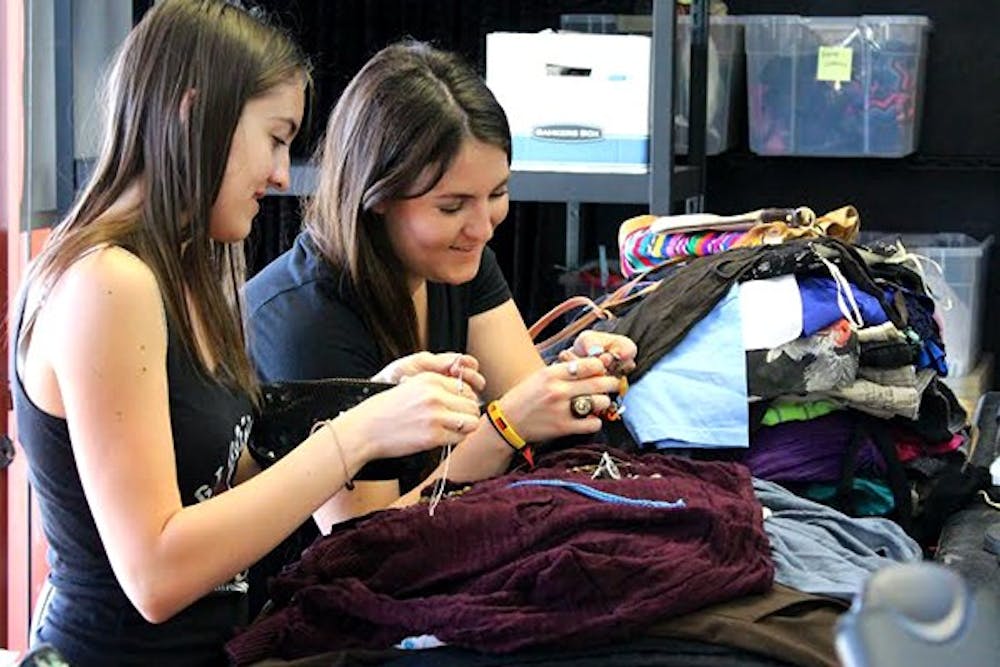 GlobeMed members Audrey Day (right) and Sophia McGovern raised $124 at Name Brand Exchange by selling clothes that were donated in order to support a beneficiary family in Uganda by building a brick house, pit latrine and water tank. (Photo by Brittany Schmus)
GlobeMed members Audrey Day (right) and Sophia McGovern raised $124 at Name Brand Exchange by selling clothes that were donated in order to support a beneficiary family in Uganda by building a brick house, pit latrine and water tank. (Photo by Brittany Schmus)
A family in Uganda will soon have access to a brick house, pit latrine and water tank thanks to the efforts of the ASU chapter of GlobeMed.
GlobeMed focuses on health awareness of people living in poverty by empowering students and communities to work together. The ASU chapter partners with ICOD Action Network to support implementing homes and sanitary projects for orphans affected by HIV/AIDs and has created a month-long clothes drive to reach that objective.
The members are collecting clothes and taking them to thrift stores to exchange for cash, along with hosting garage sales to generate funds for their summer project in Uganda.
About 1.1 million children have been orphaned by Uganda’s devastating AIDS epidemic, according to AVERT, an HIV/AIDs charity.
Kaylin Stinski, a global health senior and one of the founders of GlobeMed at ASU, said the club's members decided to do a clothes drive because it’s a very sustainable way to fundraise and because thrift stores’ inventory changes with the seasons.
“It’s kind of a more sustainable project by recycling clothes,” she said. “Instead of throwing them away or making them into rags, it’s allowing other people to enjoy those clothes.”
GlobeMed’s goal is to empower students to challenge the way traditional humanitarian work is done and involve all different majors, not just global health, to give voice to the voiceless in Uganda, Stinski said.
“It’s not just a thing that just global health majors or pre-med majors do, it’s something that every major can do,” she said. “Right now, people in Uganda are voiceless ... so we're trying to represent their voice with our work.”
Stinski said one of the challenges the chapter has encountered on campus is getting GlobeMed’s message across to students. ASU is a large university, making it difficult to create a big impact with all the other associations at school, she said.
“It’s hard, because you get lost in the mix with all the clubs and organizations,” she said. “There’s so many organizations on campus, and plenty of them are very similar.”
But no matter those challenges, the members stay positive and remain passionate for what they do because they understand the cause, Stinski said.
“They get what we are trying to do and they accept the challenge,” she said. “I was trying to explain it to my mom, what global health is and she said, ‘Oh OK, whatever, the health of the world,’ and I tell her that it’s much more than that.”
GlobeMed will be sending two students in the summer to Uganda to do a follow up on the projects the club has done.
Stinski said the students there will live and interact with the community full-time in order to understand the problems they face and be able to come up with better solutions for future projects. The selected students must be very self-motivated and be emotionally strong when presented with the living conditions of the residents, she said.
Last summer, Stinski traveled to Uganda and experienced first-hand one of the many problems residents face on a daily basis. Last year's house beneficiary lived in a “two-bedroom mud-hut" and was pregnant.
“She didn’t know how long she had been pregnant,” Stinski said. “It was kind of a shock she didn’t know she was pregnant ... but despite all that, she still has hope that her kids can go to school or college and get an education.”
Global health senior Audrey Day, one of the founders of GlobeMed at ASU, traveled with Stinski to Uganda last summer. She said the trip was an eye-opening experience to the reality of how residents in developing countries live.
“You can hear it, look at pictures or watch it on a video,” she said. “But until you’re actually there living it, seeing it and being there with the people, it’s not the same.”
The beneficiary family also consisted of four children; a 9-year-old girl, 7-year-old boy, 6-year-old boy and a 2-year-old girl, all who were half the size that they should be, Day said.
By living with the residents and getting to know them personally, Day learned that they are much more than what they appear; they are very “intelligent and self-motivated” and their only obstacle is the lack of resources, she said.
Day said she is living like a hoarder because of all the clothes she has on her car from the clothes drive, she said.
“My car is literally full with over 40 bags of clothes,” she said. “I still have another 10 bags at my sister’s house.”
If there are any clothes left that thrift stores don’t want to purchase, the members plan to donate those items to shelters in the Valley, Day said.
Megan Atencia, global health sophomore and co-president of GlobeMed, said the chapter has done multiple fundraisers in order to meet their goal for their project.
“We do a lot of individual giving, which is basically asking everyone in our network if they would like to contribute,” she said. “We also did car washes and had a silent auction.”
Atencia said they collected $1,000 from the silent auction. The big ticket items were a weekend in a condo in Rocky Point, a weekend cabin in Pine, Ariz., and a three-year maintenance contract, she said.
Anyone interested in donating to GlobeMed at ASU project can do so here or check out the chapter’s blog and their past projects here.
Reach the reporter at Adriana.Loya@asu.edu or follow her on Twitter @loyadriana




